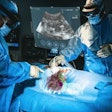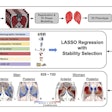
The cameras were rolling in the corner of the conference centre, where three serious-looking men with worried expressions sat on a large couch. They spoke quietly into their microphones, seemingly oblivious to their small live audience. It was hard to hear what they were saying, but it was clear they were all terribly anxious about the possibility of British work being done by people who were not from the U.K., or who were not trained in the U.K.
This event took place in the exhibition hall of this year's U.K. Radiological Conference (UKRC), as I witnessed the marketing strategy of one of the U.K.'s major providers of teleradiology services. A visit to their website confirmed that this was indeed their concern. Similar previously recorded interviews expressed the same sentiments with statements such as: "I once employed somebody from Germany. He could barely speak English and he was so bad I had to sack him."
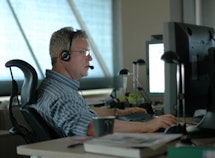 Dr. George McInnes reports for the Telemedicine Clinic in Barcelona from the U.K.
Dr. George McInnes reports for the Telemedicine Clinic in Barcelona from the U.K.
Perhaps I am biased. In medicine, more so than many other professions, one has the opportunity not only to work in one's own country with colleagues from all over the world, but also to work abroad. I have worked with doctors from all continents and, in addition to the U.K., have worked or volunteered in four other countries as a doctor. In medicine, as in life, each of us has a diverse set of skills and aptitudes related mostly to who we are -- partly due to any training we might have had and to our experience, and not at all to the geographical location of our birth nor to our current geographical location.
My own personal experience tells me British doctors on average are no more or no less competent than doctors from anywhere else.
Marketing
In the European teleradiology market, margins are tight. Each company competing in the U.K. market has its own unique solution.
One company has, according to its website, radiologists who are "all trained to a U.K. Standard, are all on the General Medical Council (GMC) Specialist Register in Clinical Radiology, and all hold substantive National Health Service (NHS) consultant appointments." This company has secured the much-respected Imaging Services Accreditation Scheme (ISAS) rating, which is an endorsement of a business model that clearly works to the satisfaction of U.K. radiology's own accreditation body. This company makes no claim to have only U.K.-trained fellows of the Royal College of Radiologists (FRCRs), but their radiologists pass a "competency assessment -- a unique recruitment and induction process along with a clinical competency framework, which ensures that each member of the team has the relevant skills and competencies to fulfil their specific role."
Another company headquartered in Barcelona has GMC-registered and -licensed radiologists, a percentage of whom are U.K.-trained/based with FRCR, but many of whom have radiology training and accreditation from other European countries, and still live there or are based in the office in Barcelona. Not only that, but it sends on-call cases from Scandinavia to European and Australian radiologists in Sydney. On its U.K. website, this company states, "New radiologists need to pass a standardized test case reporting session. If accepted, their initial 500 cases are 100% double reported. Each radiologist has to comply with the U.K. appraisal and revalidation requirements."
A third company has a network which, according to its website, "consists of U.K. trained, U.K. resident, and U.K. practicing FRCR Consultant Radiologists." Their claim to be a high-quality provider is based on "A ... radiologist will be an exact equivalent to your own radiologists: trained in the U.K., living in the U.K., working in the U.K.; an experienced consultant radiologist who knows their way around the NHS and a Fellow of the Royal College of Radiologists." These U.K. radiologists are "familiar with U.K. referral conventions and reporting structures in the U.K."
Myths
There are many myths perpetrated by the marketing departments of the various teleradiology providers feeding the anxiety and claiming to address the concerns of their potential clients.
A U.K.-based, U.K.-trained radiologist with FRCR is better than those who have trained in another country. It is not unreasonable to assert there are peculiarities to our venerable systems within the NHS which differentiate us from other countries. Arguably, a teleradiology company with an international presence would appreciate these differences and learn to cope with the idiosyncrasies of the way healthcare is practiced in all its client nations.
A company which publishes videos with derogatory anecdotes about radiologists from other countries should perhaps consider how it might back up these arguments with facts proving that radiologists based abroad are inferior to those with U.K. training and qualifications. The issue is not one of competence but one of threat. The reason this marketing ploy works is not that most U.K. radiologists are worried about the competence of our foreign colleagues, but are reluctant to confess our concern that if U.K. images are sent to countries where the cost of living is lower, it will drive down our pay and pensions, and put our very livelihood at risk. This company's marketing strategy exposes these concerns and brings them up for debate but in a different wrapper.
If confidential information goes out of the country, it might get into the wrong hands. It is true to say that many IT professionals, hospital managers, and others peripheral to the practice of radiology wring their hands worrying about this issue. They even make it difficult for us to cover on-call from home in case perhaps somebody climbs up a ladder and peers through our window and sees a name on a scan. There is a huge difference between those of us who look at a few scans at home and these IT companies and professionals who lose the data of millions of people through sheer incompetence.
You can ask a leading question to any patient: "Would you rather the scan of your wrist was interpreted by a British-trained radiologist or one trained abroad?" I suspect many might, naively, pick the British radiologist. Ask a different question: "Would you rather the scan was reported by a British-trained radiologist in the U.K. or by the radiologist in our network of 100 radiologists with the greatest expertise of wrist MRI regardless of where they trained or where they are located?"
- Fast turnaround time is important. Indeed, there are many urgent and semiurgent cases in which a fast, if not immediate turnaround, is critical to patient care. In the U.K., before the so-called "fast-track" MRI service that was reported by teleradiology companies on a strict contractual timescale, many reports were delayed by inefficient systems and a lack of reporting capacity. Since then, strict turn-around times have been introduced in all teleradiology companies and the NHS in general. While very long turnaround times are clearly to the detriment of patient care, short turnaround times can be a problem.
- Teleradiology will solve your capacity problems. It is clear to any of us who have worked in teleradiology that it has its strengths and weaknesses. In many cases, if the NHS departments who send their work to teleradiology companies were to apply the kind of efficiency and productivity tools in their own departments, adopted by the companies to whom they send the images, they would not need such help.
Again, ask two questions of the patient: "Would you rather the MRI of your wrist was reported within 48 hours or within a week?" Then ask "Would you rather your MRI was reported by the next available radiologist or by the radiologist who is a recognised expert at wrist MRI, but who only reports on Friday evenings?"
Similarly, by working within a network including radiologists in neighbouring hospitals, peaks, troughs, and local inefficiencies could be quickly eliminated. Radiologists who say they are interrupted so much they can't report should consider how they might change their working practices, not send their images to somebody else that already has. Teleradiology is ideally suited to on-call work where images can be sent to a radiologist in another time zone. To send the images to another radiologist with a full-time job in the same time zone makes no sense. Not only should Australia be doing our on-call but we should be doing theirs.
Money
In the end, it all comes down to money. Teleradiology is not a cheap product. It requires robust IT solutions. Software and hardware are expensive, audit is an added cost, and the remuneration for the radiologist has to be enough for them to give up their own time, often in addition to a full-time job. Currently, margins are tight and the more complex or time-consuming the case, the less enticing it is for the radiologist.
Prices are driven down by competitive contracting eroding the margins still further. If there were no regulation, unless the purchasers were to stipulate specific requirements, reports could end up being produced by radiologists from economies where medical remuneration is lowest, leading to a gradual dislocation of professional skills to the detriment of medical care in the higher-wage economies.
If we allow individual companies to set the agenda by leading us into a rather tacky discussion on the competence levels of radiologists based on irrelevant factors such as their current location or the country in which they were trained, then the argument is debased and a robust conclusion is unlikely to be achieved.
Conclusion
Of three of the major teleradiology providers for the U.K. market, two market themselves on the basis of quality, rigorous testing, and audit of their radiologists. The major emphasis of the other company is that its radiologists are U.K.-trained and work in the U.K. A clear regulatory framework is required that recognises cross-border teleradiology exists, that addresses legitimate quality concerns, and prevents all the work drifting to lower wage economies while benefiting from the expertise of radiologists across Europe and further afield.
The clients of teleradiology companies perceive that sending their images to an outside provider is the best solution to coping with perceived capacity problems. However, teleradiology companies on tight margins apply productivity tools and economies of scale to deal with the workload which, if applied by the client NHS departments, might deal with these very capacity issues, particularly if they partner with neighbouring hospitals.
Teleradiology companies would do well to market themselves as troubleshooters using their own expertise to show struggling departments how best to use their staff and equipment, and providing teleradiology backup if and when necessary.
References
www.4whc.comwww.telemedicineclinic.co.uk
www.medicagroup.co.uk
Dr. George McInnes, FRCR, is a consultant radiologist at Poole Hospital NHS Foundation Trust.
Competing interests: Dr. McInnes was employed by Telemedicine Clinic in Barcelona from 2006 to 2009 and continues to report for them from the U.K. He has a small shareholding in the company.
The comments and observations expressed herein do not necessarily reflect the opinions of AuntMinnieEurope.com, nor should they be construed as an endorsement or admonishment of any particular vendor, analyst, industry consultant, or consulting group.



